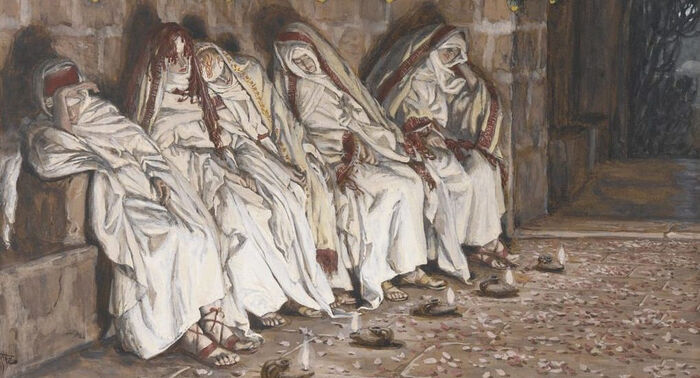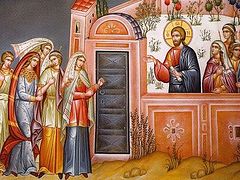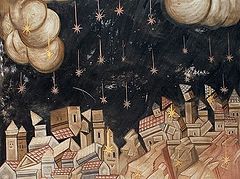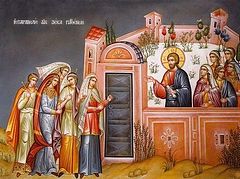We spoke extensively on Holy Monday about the Bridegroom Who comes in the middle of the night. This is Holy Tuesday. The Church, at today’s Matins (popularly chanted last night), teaches us to love the Bridegroom: Let us love the Bridegroom, O brethren, and prepare our lamps, shining with the virtues and a right faith; that, like the wise virgins of the Lord, we may be ready to enter with Him into the wedding feast. For as God He grants unto all the Bridegroom’s gift; the crown incorruptible. Brethren, how our lamps flicker out! How the soul is weary and sleeps while the Bridegroom comes for the midnight feast, unexpectedly and mystically! Today we hear the parable of the Ten Virgins, and the parable of the Talents. In the parable of the Ten Virgins, five are foolish and five are wise. Five prepared their lamps adequately, and five floundered in the cares of the world with their precarious preoccupations with the mundane and trivial. In the middle of the night a voice was heard: Behold, the Bridegroom comes, go forth to meet Him! In the parable of the Talents, the Lord entrusts to His servants a certain number of talents, expecting their multiplication. All multiply their talents except the servant who received just one. He returns to the Master saying, Lord, I know you are a hard man, and I was afraid I would squander Your precious talent. So I hid it in the earth! Now, here it is! Take back what’s rightfully Yours! Profound is the mystery of the Bridegroom’s wedding feast. Only those who bring the gift invested will be granted entrance. This is the eternal Kingdom, wherein we shall see, know, and love. We return to this word: love. The Church commands us: Brethren, love the Bridegroom! How has such a love grown in each of us? Perhaps we have, like the five foolish virgins, been lazy and slothful? Ah, how the Holy Church rouses the slothful sinner with the deeply moving, profound, hymnody of these greatest of days! How can the most slothful soul not be roused when it hears the chanters sing, Let us cast far from us slothfulness, and with brightly shining lamps meet Christ the immortal Bridegroom with hymns.
The subject of this, the greatest of Tuesdays, is precisely the meeting of our soul with the Bridegroom. This meeting occurs only if the oil—love and good works and mercy in the soul—is brimming. It occurs only if the lamp is burning bright. How else will we see the Bridegroom? How will we discern and know the path to the bridal chamber? This path weaves up and down, down and up through the dark mountains of this life. How can we enter the Kingdom when we as Christians hate, conspire, and destroy—not others, but our own selves, our own brethren? The need for brotherhood and a bond of love, which we will hear about on Holy Thursday as being the force that united the Apostles… I ask: Might this be lacking in our families and in our parishes? May there be a sufficiency of the oil of fellowship in the vessels of our soul, that we need not purchase any at the time of the reward. These words are also heard at the Matins of Holy Tuesday. Yet how many will scatter at the time of the reward because they did not take heed to keep the oil clean, the lamp filled, the wick trimmed and burning? As we contemplate the mystery of these solemn days, as we turn away from the temporal things and focus on the events that took place two thousand years ago within the perspective of them mystically occurring now, in the timeless nature of the divine services of Holy Orthodoxy that alone express the life of Christ, His sublime Passion, His Honorable Crucifixion and Death—I ask: Are we simply going through empty motions of ritual with empty lamps, darkened souls, and confounded minds?
Perhaps the least attended service of all Holy Week services is the Matins of Holy Tuesday. Everyone went to see the Bridegroom come forth from the altar on Palm Sunday evening, and on Holy Tuesday evening itself, at the Matins of Holy Wednesday, the Church is crowded (at least it was in the pre-COVID-19 era) by the multitudes who come to listen to the moving hymn of Kassiani. Then they come to be anointed at Unction on Holy Wednesday, and to dye a couple dozen eggs on Holy Thursday afternoon; and then, on Holy Thursday evening to run off to hear a Gospel or two while they watch the priest bring the out Crucified One as we hear the hymn, Today is Hung on the Cross. Then on Holy Friday we see the beautifully adorned Epitaphios in procession and compare each parish’s, which one has outdone the others in the decoration of their Epitaphios. On the Paschal night we see the fireworks while Christ is Risen is sung, and... This is, without a doubt, unfortunately what could be called, “Holy Week: Greatest Hits.” And nothing of particular “note” occurs on Holy Monday afternoon. So, the Matins of Holy Tuesday is something superfluous, and these solemn evening hours are reserved for baking, running errands, and preparations for the Paschal festivities.
Another moving hymn from this day’s Matins reminds me that I am unmoved in my insensitivity, I am fixed in my pick-and-chose Christianity: I slumber in slothfulness of soul, O Bridegroom Christ I have not a lamp aflame with the virtues, and like the foolish virgins I have wandered off when it hath been time for action. The lamp is out, the oil is depleted, the virtues are dead. Soul, how you wander, and how you neglect! The talents are not multiplied, and though given specific talents by Christ—whether it be the talent of ministering to others, or decorating or cleaning the parish church on these solemn days, or singing in the services, or writing something edifying or perhaps something poetic, ministering to the sick, visiting the elderly—whatever the case may be, the talents entrusted to us are returned, and all we have said is, Lord, behold here is thine own! And at the eternal Pascha at the end of days, there is no oil in our lamps, no multiplied talents in the soul’s bank (the heart)!
Through participation in Thy sufferings; take from me the disfigurement of sin, and clothe me in the glorious robe of Thy comeliness. Here is the key to multiplying the talents and keeping the lamp brimming with rich, green oil: through participation in Thy sufferings. The slothful soul preaches to itself: You have many cares, you work and run here and there. How could you endure two hours in church tonight with the Bridegroom? Stay here, rest up, eat. You’ll go on Holy Thursday—that’s good enough. The Twelve Gospels—it’ll be certainly long enough! We must love Orthodoxy’s Passion services, these solemnities, because they are the highest expression of Christian piety, they are the calming expression of our ancestors’ hopes and aspirations. And if we shy away from coming to church on these solemn days, where we internalize the timeless events of Christ’s life, how can we then say we are prepared to meet the Bridegroom? That would be like going to University twice a year and claiming we will graduate—and with honors at that!
It is here, in the services, where we receive the grace, the power, and the inspiration required for us to take Christ to the world. Many say none of this is important, that He won’t ask us if we’ve been to Bridegroom Matins—all this ritual! He will just ask us if we’ve fed the poor and clothed the naked. This spirit is the Anglicization of Orthodoxy, the socialization of Christianity. We receive the inspiration to serve others from the wealth which is called Orthodox Tradition. With all our spiritual, physical, and mental energy, we must combat the individualism of our society, which teaches us to please ourselves. Those who say these things, I guarantee you, are not to be found manning the soup kitchens. We should expend our energy in beautifying the Lord’s temple, in the proper execution of the divine services—the same services which deeply formed and guided our ancestors. George Seferis, who (along with Elytis, Solomos, and Palamas) is the national poet of Greece, was so moved by these days that he wrote, “The loftiest form of springtime that I know: the Holy Week of the Greeks.” Come then, let us enter the bridal chamber of the solemnity of Christ’s divine and blameless Passion with cleansed souls—souls cleansed in Holy Confession, cleansed with tears of repentance and adorned with the desire to live for Him and Him alone, the lamp of our soul’s virtue shinning with an immaculate light that burns on the choicest virgin oils— service to the poor, the needy, the sick, and the elderly—with such a comely disposition of soul. come, let us meet Christ the Immortal Bridegroom of Christian souls in the silence of these sacred, immortal evenings of this greatest of weeks.




